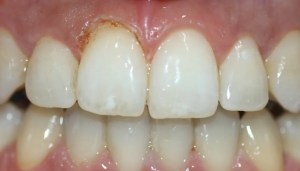Periodontics is the area of dentistry that is responsible for maintaining the hard (mainly bone) and soft (gums) tissues that 'hold' the teeth in optimal conditions, paying special attention to hygiene 'under' the gums, and to their correct maintenance both in and out of the clinic.
One of the frequent applications of this discipline is the remodelling of the soft tissues, the gums, which can be developed, among other ways, through simple procedures such as a gingivectomy, which allows us, among other things:
- Perform conservative dentistry treatments below the gum line in a safe and moisture-free manner.
- Shaping the gum to make our smile look as aesthetically pleasing as possible, both 'white' (of the teeth) and 'pink' (of the gum).
In this blog post we will discuss how a gingivectomy can help us to improve the dental aesthetics of a young patient who wanted to enjoy a harmonious and balanced smile, and who saw that one of her upper central incisors (commonly known as 'palette' or 'paleto') was larger than the other.

After examining it, the periodontist experienced in soft tissue remodelling techniques determines that the difference in size is not the size of the teeth, but the position of the gum, which in one case covers more teeth than in the other.

In this way, the patient is offered a gum remodelling treatment, which is carried out under local anaesthesia, in a simple and painless way for the patient.

Once the area is 'asleep', the periodontist selects an electroscalpel to perform the treatment in a way that does not cause bleeding, removing the gum as if we were 'drawing' a new gum contour, in just a few minutes of intervention.
At the end of the treatment, the patient can go about her normal life, as the only effect on the gum is the significance of some epithelial debris, which does not interfere with her speech or eating.

Thus, one week later, the appearance of the gums is completely normal and the patient can finally enjoy the smile she wanted: symmetrical and harmonious, thanks to a simple treatment carried out by an recognised periodontist used to this type of clinical soft-tissue remodelling interventions.


